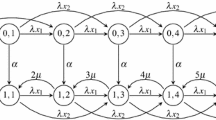Abstract
We study a processing system comprised of parallel queues, whose individual service rates are specified by a global service mode (configuration). The issue is how to switch the system between various possible service modes, so as to maximize its throughput and maintain stability under the most workload-intensive input traffic traces (arrival processes). Stability preserves the job inflow–outflow balance at each queue on the traffic traces. Two key families of service policies are shown to maximize throughput, under the mild condition that traffic traces have long-term average workload rates. In the first family of cone policies, the service mode is chosen based on the system backlog state belonging to a corresponding cone. Two distinct policy classes of that nature are investigated, MaxProduct and FastEmpty. In the second family of batch policies (BatchAdapt), jobs are collectively scheduled over adaptively chosen horizons, according to an asymptotically optimal, robust schedule. The issues of nonpreemptive job processing and non-negligible switching times between service modes are addressed. The analysis is extended to cover feed-forward networks of such processing systems/nodes. The approach taken unifies and generalizes prior studies, by developing a general trace-based modeling framework (sample-path approach) for addressing the queueing stability problem. It treats the queueing structure as a deterministic dynamical system and analyzes directly its evolution trajectories. It does not require any probabilistic superstructure, which is typically used in previous approaches. Probability can be superposed later to address finer performance questions (e.g., delay). The throughput maximization problem is seen to be primarily of structural nature. The developed methodology appears to have broader applicability to other queueing systems.
Similar content being viewed by others
References
M. Armony, Queueing networks with interacting service resources, Ph.D. Dissertation, Stanford University (1999).
M. Armony and N. Bambos, Queueing networks with interacting service resources, in: Proc. of Allerton Conference 1999, Urbana, 1999, pp. 42–51.
F. Baccelli and P. Bremaud,Elements of Queueing Theory (Springer, Berlin, 1994).
N. Bambos and J. Walrand, Scheduling and stability aspects of a general class of parallel processing systems, Adv. in Appl. Probab. 25 (1993) 176–202.
N. Bambos and K. Wasserman, On stationary tandem queueing networks with job feedback, Queueing Systems 15 (1994) 137–164.
S.L. Bell and R.J. Williams, Dynamic scheduling of a system with two parallel servers in heavy traffic with complete resource pooling: Asymptotic optimality of a continuous review threshold policy, Ann. Appl. Probab. 11 (2001).
V. Böhm, On the continuity of the optimal policy set for linear programs, SIAM J. Appl. Math. 28(2) (1975) 303–306.
A. Budhiraja and P. Dupuis, Simple necessary and sufficient conditions for the stability of constrained processes, SIAM J. Appl. Math. 59(5) (1998) 1686–1700.
H. Chen and A. Mandelbaum, Discrete flow networks: bottleneck analysis and fluid approximations, Math. Oper. Res. 16 (1991) 408–446.
J.G. Dai, On positive Harris recurrence of multiclass queueing netowrks: A unified approach via fluid limit models, Ann. Appl. Probab. 5 (1995) 49–77.
J.G. Dai, Stability of fluid and stochastic processing networks, MaPhySto 9 (1999).
J.G. Dai and B. Prabhakar, The throughput of data switches with and without speedup, in: Proc. of IEEE INFOCOM 2000, 2000, pp. 556–564.
G.B. Dantzig and M.N. Thapa, Linear Programming 1: Introduction (Springer, Berlin, 1997).
P. Dupuis and R. Atar, Optimally stabilizing controls for a deterministic network model, in: Proc. of the Allerton Conference 1999, Urbana, 1999.
N. Gans and G.J. van Ryzin, Optimal control of a multiclass, flexible queueing system, Oper. Res. 45(5) (1997) 677–693.
N. Gans and G.J. van Ryzin, Optimal control of a parallel processing queueing system, Adv. in Appl. Probab. 30 (1998) 1130–1156.
J.M. Harrison, Heavy traffic analysis of a system with parallel servers: asymptotic optimality of discrete-review policies, Ann. Appl. Probab. 8 (1996) 822–848.
J.M. Harrison, The BIGSTEP approach to flow management in stochastic processing networks, in: Stochastic Networks: Theory and Applications, eds. F. Kelly, S. Zachary and I. Ziedins (Oxford Univ. Press, Oxford, 1996) pp. 57–90.
N. Kahale and P.E. Wright, Dynamic global packet routing in wireless networks, in: Proc. of IEEE INFOCOM 1997, 1997, pp. 1414–1421.
R. Leelahakriengkrai and R. Agrawal, Scheduling in multimedia DS-CDMA wireless networks, Technical Report ECE-99-3, ECE Department, University of Wisconsin, Madison, IEEE Trans. Vehicular Technol. (1999) to appear.
R. Leelahakriengkrai and R. Agrawal, Scheduling in multimedia wireless networks, in: 17th Internat. Teletraffic Congress, Salvador da Bahia, Brazil, 2001.
C. Maglaras, Dynamic scheduling in multiclass queueing networks: stability under discrete-review policies, Queueing Systems 31 (1999) 171–206.
C. Maglaras, Discrete-review policies for scheduling stochastic networks: fluid asymptotic optimality, Ann. Appl. Probab. 10(3) (2000) 897–929.
N. McKeown, A. Mekkittikul, V. Anantharam and J. Walrand, Achieving 100% throughput in an input-queued switch, IEEE Trans. Commun. 47(8) (1999) 1260–1267.
S. Meyn, Feedback regulation for sequencing and routing in multiclass queueing networks, in: 2000 IEEE Internat. Symposium on Information Theory, Sorrento, Italy, 1999.
A. Stolyar, MaxWeight scheduling in a generalized switch: state space collapse and workload minimization in heavy traffic (2001) submitted.
L. Tassiulas and P.P. Bhattacharya, Allocation of interdependent resources for maximal throughput, Stochastic Models 16(1) (1999).
L. Tassiulas and A. Ephremides, Stability properties of constrained queueing systems and scheduling policies for maximum throughput in multihop radio networks, IEEE Trans. Automat. Control 37(12) (1992) 1936–1948.
K.M. Wasserman and T. Lennon Olsen, On mutually interfering parallel servers subject to external disturbances, Oper. Res. 49(5) (2001) 700–709.
Author information
Authors and Affiliations
Rights and permissions
About this article
Cite this article
Armony, M., Bambos, N. Queueing Dynamics and Maximal Throughput Scheduling in Switched Processing Systems. Queueing Systems 44, 209–252 (2003). https://doi.org/10.1023/A:1024714024248
Issue Date:
DOI: https://doi.org/10.1023/A:1024714024248




